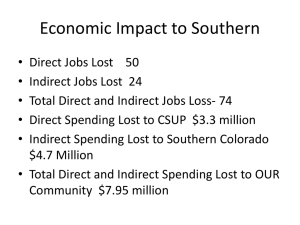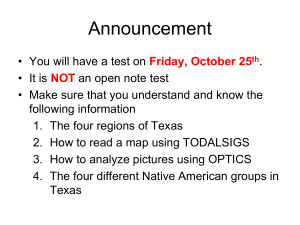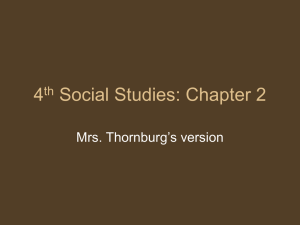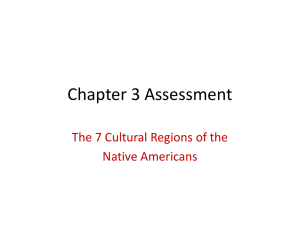Public Health Prioritization Process Community Presentation
advertisement
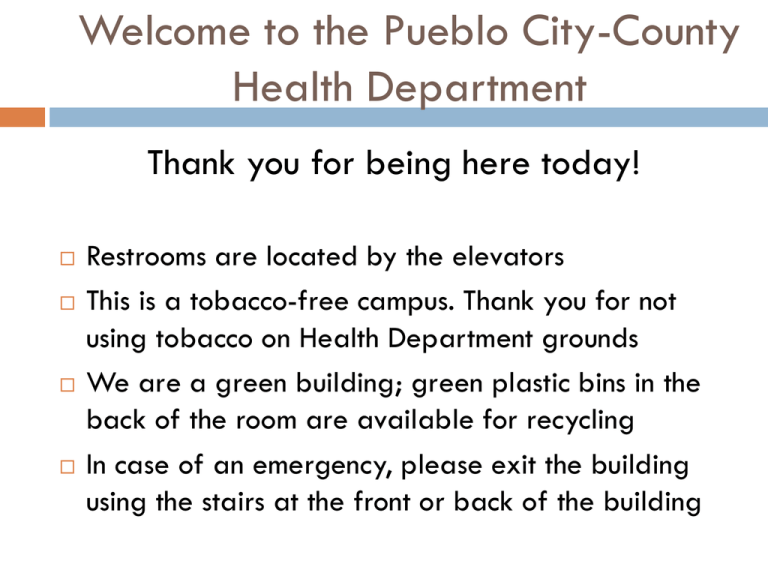
Welcome to the Pueblo City-County Health Department Thank you for being here today! Restrooms are located by the elevators This is a tobacco-free campus. Thank you for not using tobacco on Health Department grounds We are a green building; green plastic bins in the back of the room are available for recycling In case of an emergency, please exit the building using the stairs at the front or back of the building Agenda Introduction/Purpose of Meeting (15 minutes) Community Process to Determine Priorities (15 minutes) Overview of Public Health Priorities: statistics, capacity, possible strategies (60 minutes) Community Input (30 minutes) Break (10 minutes) Rank Public Health Priorities (30 minutes) Next Steps (10 minutes) Process to Narrow Down Priorities PUEBLO COMMUNITY HEALTH ASSESSMENT Mission of Pueblo Community Health Assessment Pursuant to the Colorado Public Health Reauthorization Act –Colorado counties are required to complete a comprehensive community health assessment. To that end, Pueblo City-County Health Department is tasked to partner with various county-wide organizations and individuals to complete a community health assessment. The purpose of the assessment is to assist Pueblo in deciding what its community health priorities are for the next 5 years and what strategies will be used by various public health organizations and partners to improve the overall health of Pueblo residents. * Based on geography of Pueblo County Contributions to Health Assessment Process PCCHD Community Health Assessment Team Internal (CHATI) Members: Heather Maio Chad Wolgram Jenna Ward Julie Kuhn Lynn Procell Kim Whittington Sarah Joseph Shylo Dennison Community Health Assessment Steering Committee Members Donald Moore Mary Gunn Randy Evetts Angela Jensen Tony LaCombe John LeFebre Charlotte Yianokopolus-Veatch Cindy Lau Kirsten Taylor Michelle DesLauriers Barb Mettler Steps of the Community Health Assessment 1) Community Health Assessment & Status Report (Data collection based on health indicators; strengths; & weaknesses) 2) Capacity Assessment & Report (Who is doing what & how well?) 3) Prioritization process of public health issues for community 4) Community Health Improvement Plan (Priorities identified and responsibilities assigned) 5) Strategic Plan for Pueblo CityCounty Health Department Top 8 Priorities *In alphabetical order Cardiovascular Disease Communicable/Infectious disease prevention Diabetes Lack of providers/Access to care Mental health Obesity (adult and childhood) Poverty Teen Pregnancy/Unintended pregnancy Cardiovascular Disease 400 200 Pueblo 0 ke ai lu re ise as es /s tr o di ea rt ov as cu l ar d )h He ar tf se as es ar t he on ar y (c or Di se as es o ft he se as e Colorado Ce re br Minority populations have greater disparities for CVD 600 Isc he m ic 26% of all deaths caused by Heart Disease in Pueblo Disparities 800 di 1000 as cu la r 1074.2 per 100,000Pueblo County 961.8 per 100,000Colorado 1200 ov Hospital Discharge for CVD, 2009 Age-Adjusted Rate (per 100,000) Rate of Cardiovascular Disease M aj or ca rd i Cardiovascular Disease Evidence based strategies Comprehensive strategies to reduce blood pressure (http://www.bmj.com/content/326/7404/1419.short) Ensure screenings for high risk individuals (http://www.bmj.com/content/326/7404/1419.short) Communicable/Infectious Disease Influenza (flu) Pueblo County: 33 influenza-associated hospitalizations 2010-2011 Disparities Colorado average: 20.9 Elderly Infants Immune-compromised individuals Tuberculosis Pueblo County: 1.9 cases per 100,000 Colorado: 2.3 cases per 100,000 Disparities Prison and homeless populations Communicable/Infectious Disease The Rate of Positive Chlamydia Cases Reported in 1524 Year-Olds per 100,000 Rate per 100,000 people 4000 3500 3000 2500 Pueblo 2000 Colorado 1500 1000 500 0 Females Males Disparities 18-24 year olds Minority females Those with multiple partners Drug users Communicable/Infectious Disease Evidence based strategies (www.cdc.gov) Increase vaccines with chart reminders, electronic health records, mailed/telephoned reminders Comprehensive education on preventing transmission Increase and encourage testing Diabetes 5% of all deaths in Pueblo are caused by Diabetes Mellitus, Type II Evidence based strategies (www.thecommunityguide.org) Case management interventions to improve glycemic control Self-management education in communitygathering places for adults with type 2 diabetes Lack of Providers/Access to Care % enrolled in Medicare and dual eligible in 2008-2009 12.40% 18.80% Pueblo Weld Mesa Colorado 17.10% 10.90% Disparities Low socioeconomic individuals Ethnic and minority populations Lack of Providers/Access to Care Evidence based strategies Ensuring eligible individuals are enrolled in available insurance programs (i.e. CHP+, Medicaid, etc.) Increase the number of physician assistants and nurse practitioners Safety Net Provider Locations in Pueblo County, 2007 Type # of Clinics Rural Health Clinics 0 and Emergency Departments 2 Safety Net Dental Clinics 1 Safety Net Mental Health Clinics 3 School Based Health Centers 5 Clinic Delivery Sites 5 Other Primary Care Clinics 0 ClinicNet Clinics 1 Public Health Departments and Nursing Services that Provide Primary Care Services 1 Mental Health Poor mental health days was highest at 31% for ages 18-24 in Pueblo County Disparities Greatest percentage of suicides occurred among non-Hispanic whites Highest race/ethnicity and age-specific rates were among American Indian/Alaska Native adolescents and young adults. Parents who reported behavioral or mental health problems in children ages 1-14 27 26.5 26 Percentage 25.5 25 24.5 24 Pueblo Colorado Mental Health Evidence based strategies Collaborative care for managing depressive disorders Home and clinic-based depression care management Poor Mental Health Days, 2009 4 Average Number of Unhealthy Days 3.5 3 2.5 2 1.5 1 0.5 0 Pueblo Colorado National Benchmark Obesity Children Eating Fruits and Vegetables Pueblo County: 5.8% consumed five or more fruits and vegetables per day Colorado: 9.6% Percent of Overweight and Obese Adults, 20072009 35 70 30 60 25 50 20 Obese Overweight/Obese 15 10 Percent of Adults Percent of Youth Percent of Youth (ages 2-14) Overweight and Obese, 2007-2009 40 Obese Overweight/Obese 30 20 5 10 0 Pueblo Colorado HP 2020 objective 0 Pueblo Colorado HP 2020 Objective Obesity Disparities Lower socioeconomic status and middle income (living in suburban areas without connectivity) Minority populations Evidence based strategies (www.thecommunityguide.org) Behavioral interventions to reduce screen time Multi-component coaching or counseling interventions to reduce weight and maintain weight loss Worksite wellness programs (trainings, policy/system changes) Poverty Percent of Pueblo County Population in Poverty, 2009 % of total population 30 25 20 Pueblo 15 Colorado 10 5 0 adult poverty Median Household Income, 2009 $60,000 Dollars in Thousands $50,000 $40,000 $30,000 $20,000 $10,000 $0 Pueblo Colorado child poverty Poverty Disparities Ethnic and Minority Populations Evidence based strategies Increase financial literacy (http://www.practicalmoneyskills.com/foreducators/stat e_standards/process.php) Improve graduation rates (http://www.cdc.gov/PCD/issues/2007/oct/pdf/07_0 063.pdf) Teen/Unintended Pregnancy Pueblo County: 55.6% unintended and 44.4% intended Pueblo County Hispanic population: 49.7% of pregnancies considered intended In 2009, 17% of all births in Pueblo County were to teens Teen/Unintended Pregnancy Disparities Lower socio-economic women Young women whose mothers were teen moms Hispanic teens Evidence based strategies (www.thecommunityguide.org) Youth development, behavioral interventions: interventions coordinated with community service to reduce sexual risk behaviors in adolescents Comprehensive risk reduction intervention for adolescents (abstinence as well as other scientifically proven prevention methods) Questions? For Further Questions Call Shylo Dennison, Public Health Planner 719-583-4353 dennison@co.pueblo.co.us
